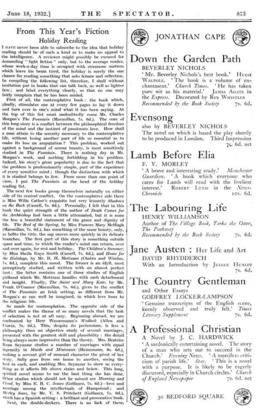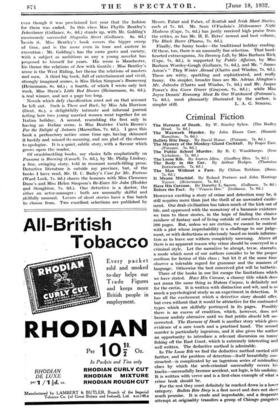From This Year's Fiction
Holiday Reading I HAVE never been able to subscribe to the idea that holiday reading should be of such a kind as to make no appeal to the intelligence. A reviewer might possibly be excused for demanding " light fiction " only, but to the average reader, whose work-a-day time is occupied with strenuous matters which leave his brain tired, the holiday is surely the one chance for reading something that asks leisure and reflection. In compiling the following list, therefore, I shall without hesitation put in books that can talk back, as well as lighter. fare ; and label everything clearly, so that no one may fairly complain that he has been misled.
First of all, the contemplative book : the book which, ideally, stimulates one at every few pages to lay it down and turn over in one's mind what it has been saying. At the top of this list must undoubtedly come Mr. Charles Morgan's The Fountain (Macmillan, 7s. 6d.). The core of this long story is a conflict between the philosophical freedom of the mind and the instinct of passionate love. How shall a man attain to the serenity necessary to the contemplative life, without losing another part of life so essential as to make its loss an amputation ? This problem, worked out against a background of serene beauty, is most sensitively studied in The Fountain. There is nothing dry in Mr. Morgan's work, and nothing forbidding in his problem. Indeed, his story's great popularity is due to the fact that the problem is predominantly simple, part of the experience of every sensitive mind ; though the distinction with which it is studied belongs to few. From more than one point of view, I put The Fountain at the head of the holiday reading list.
The next few books group themselves naturally on either side of its central conflict. On the contemplative side there is Miss Willa Cather's exquisite but very leisurely Shadows an the Rock (Cassell, 7s. 6d.). Personally, I felt that in this book the quiet strength of the author of Death Comes for the Archbishop had been a little attenuated, but it is none the less a beautiful statement of the grace and dignity of life. The Bud of the Spring, by Miss Frances Mary McHugh (Macmillan, 7s. 6d.), has something of the same beauty, only, as befits the title, the sap moves more quickly in its delicate branches. The first part of this story is something outside space and time, to which the reader's mind can return, over and over again, for rest and holiday. The Children's Summer, by Miss Sheila Kaye Smith (Cassell, 7s. 6d.), and Home for the Holidays, by Mr. R. H. Mottram (Chatto and Windus, Is. 6d.), complete this mood. The former is an idyll, most perceptively studied, and written with an almost perfect tact : the latter contains one of those studies of English girlhood which Mr. Mottram handles with such detachment and insight. Finally, The Saint and Mary Kate, by Mr. Frank O'Connor (Macmillan, 7s. ad.), gives to the conflict of The Fountain an Irish setting, as different from Mr. Morgan's as can well be imagined, in which love loses to the religious life.
So much for contemplation. The opposite side of the conflict makes the theme of so many novels that the task of selection is not at all easy. Beginning abroad, we are confronted by Herr Wassermann's Wedlock (Allen and Cowin, 7s. 6d.). This, despite its pretensions, is less a philosophy than an objective study of several marriages, presented with the greatest skill and plausibility : the detail being always more impressive than the theory. Mrs. Beatrice Kean Seymour studies a number of marriages with equal ingenuity in Maids and Mistresses (Heinemann, Gs. 6d.), slaking a servant girl of unusual character the pivot of her story. Sally goes from one home to another, seeing the best in each, and enabling Mrs. Seymour to show us every- thing as it affects life above stairs and below. This long, spirited novel seems to me the best thing she has done. Other studies which should not be missed are Morning and Cloud, by Miss E. B. C. Jones (Gollancz, 7s. 6d.)—love and marriage among the intellectuals of Hampstead ; and Shirley Sanz, by Mr. V. S. Pritchett (Gollancz, 7s. 6d.), Which has a Spanish setting : a brilliant and provocative book.
Next, the double-deckers. There is no lack of these, even though it was proclaimed last year that the fashion for them was ended. In this class Miss Phyllis Bentley's Inheritance (Gollanez, 8s. 6d.) stands up, with Mr. Golding's enormously successful Magnolia Street (Gollancz. Ss. 6d.) `beside it. Miss Bentley's book covers the bigger sweep of time, and is the more even in tone and austere in execution : Mr. Golding's has the more gusto -and variety, with a subject as ambitious as any a young novelist has proposed to himself for years. His scene is Manchester, his theme bhe relations of Jew with Gentile : Miss Bentley's scene is the West Riding, her theme the relations of masters and men. A third big book, Rill of entertainment and vivid, strongly imagined scenes, is Miss Helen Simpson's Boomerang (Heinemann, 8s. 6d.) ; a fourth, of which I wrote only last week, Miss Stern's Little Red horses (Heinemann, 8s. 6d.), a-real winner, and not a page too long.- ' Novels which defy classification must not on that account be left out. Such is There and Back, by Miss Ada Harrison (Dent, 6.s.), a delightfully intimate and informal journal telling how two young married women went together for an Italian holiday. A second, resembling the first only in having an Italian scene, is Miss Beatrice Curtis Brown's For the Delight of Antonio (Macmillan, 7s. (id.). I gave this book a perfunctory notice some time ago, having skimmed it hastily and missed its meaning, and am glad of the chance to apologize. It is a quiet, subtle story, with a flavour which grows upon the reader.
Of swashbuckling books, my choice falls emphatically on Panama is Burning (Cassell, 7s. 6d.), by Mr. Philip Lindsay, a fine, swinging story, told in resonant mouth-filling prose. Detective literature is outside my province, but, of the books I have read, Mr. H. C. Bailey's Case for Mr. Fortune (Ward Lock, 7s. 6d.) shares the honours with Miss Clemence Dane's and Miss Helen Simpson's Re-Enter Sir John (Hodder and Stoughton, Is. 6d.). One detective is a doctor, the other an actor-manager : both are unusually skilful and skilfully unusual. Lovers of short stories have a fine batch to choose from. Two excellent selections are published by Messrs. Faber and Faber, of Scottish and Irish Short Stories, each at 7s. 6d. Mr. Sean O'Faolain's Midsummer Night Madness (Cape, 7s.. 6d.) has justly received high praise from the critics, as has Mr. H. E. Bates' newest and best volume, The Black Boxer (Pharos, Is. 6d.).
Finally, the funny books-the traditional holiday reading. Of these, too, there is an unusually fine selection. That hard- hearted extravaganza, No Decency Left, by Miss Barbara Rich (Cape, 7s. Od.), is supported by Public Affaires, by Miss Barbara Worsley-Gough (Gollancz, 7s. 6d.), and Mr. " James Aston's " They Winter Abroad (Chatto and Windus, 7s. 6d.). These are witty, sparkling and sophisticated, and really funny. On simpler, broader lines are Mr. Adrian Alington's Mr. Jubenka (Chatto and Windus, 7s. 6d.) and Mr. Jasper Power's Sea Green Grocer (Grayson, 7s. 6d.) ; while Miss Joyce Dennis' Economy Must Be Our Watchword (Putnam's, 7s. 6d.), most pleasantly illustrated by the author, is









































 Previous page
Previous page